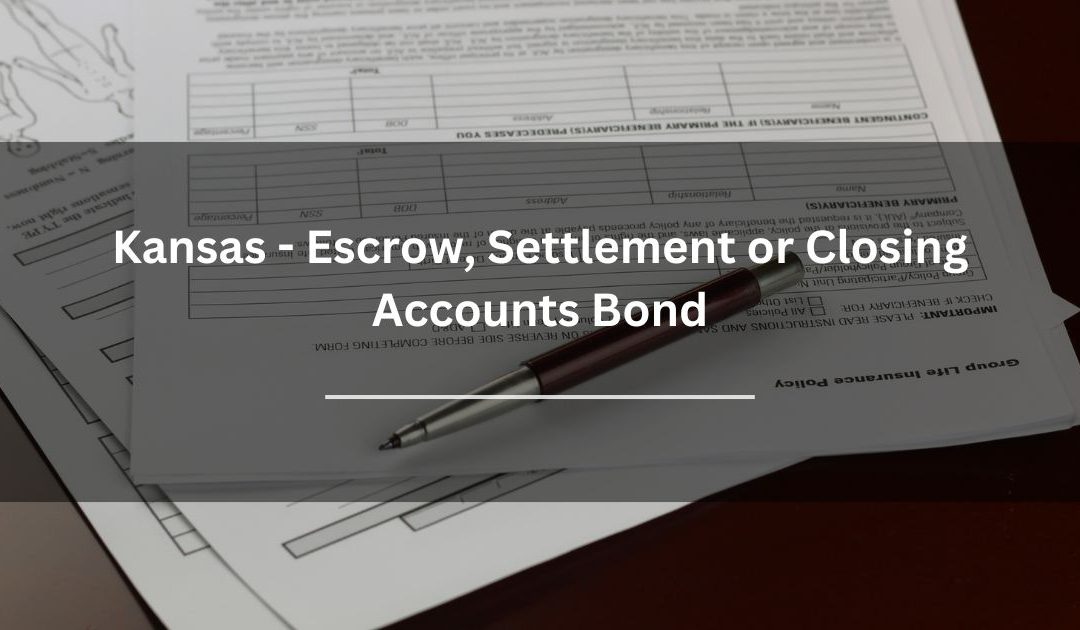Get an Instant Quote on Escrow, Settlement or Closing Accounts Bond
Introduction
Real estate and financial transactions require strict oversight to protect consumer funds. Businesses handling escrow, settlement, or closing accounts in Kansas must comply with state laws to maintain financial transparency. The Kansas - Escrow, Settlement or Closing Accounts Bond is a mandatory surety bond that guarantees businesses meet regulatory obligations while safeguarding client assets.
Securing this bond is essential for companies operating in Kansas. It reinforces trust, ensures compliance, and prevents financial misconduct. Understanding its purpose and benefits is critical for businesses that manage third-party funds.

Common Misconceptions About This Bond
Many businesses mistakenly believe this bond functions as insurance, protecting them from financial loss. In reality, it guarantees that escrow agents and settlement companies will fulfill their legal and ethical obligations. If a business violates state laws or mishandles funds, the bond compensates affected parties, and the business must reimburse the surety.
Some companies also underestimate the consequences of failing to maintain this bond. Kansas law requires businesses managing escrow accounts to keep an active surety bond throughout their licensing period. Without it, they risk losing their license and facing regulatory penalties.
Expert Guidance for Securing an Escrow Bond
Based on experience, obtaining a surety bond should be a straightforward process when working with a trusted provider. The Kansas - Escrow, Settlement or Closing Accounts Bond ensures compliance with financial regulations, allowing businesses to operate legally.
With the right guidance, businesses can avoid unnecessary delays, secure competitive rates, and meet state requirements efficiently. This bond strengthens a company’s reputation by demonstrating financial responsibility and regulatory adherence.

Steps to Obtain the Kansas - Escrow, Settlement or Closing Accounts Bond
What has been discovered is that securing this bond requires a few key steps:
- Determine the Required Bond Amount – Kansas regulations set the bond amount based on the type of escrow services provided.
- Choose a Reputable Surety Provider – Selecting an experienced provider ensures quick approvals and fair pricing.
- Submit a Bond Application – Companies must provide business details, licensing information, and financial history.
- Receive a Bond Quote – The surety evaluates risk factors and determines the premium cost.
- Pay the Premium – The final price depends on the company’s financial stability and the bond amount required.
- File the Bond with the State – The bond must be submitted to the relevant regulatory agency to complete licensing.
Following these steps ensures businesses meet compliance requirements and maintain smooth operations.

Consequences of Not Maintaining an Active Bond
In observation, failing to obtain or renew the Kansas - Escrow, Settlement or Closing Accounts Bond can have serious consequences. Businesses may face:
- License suspension or revocation – Operating without a valid bond violates Kansas regulations.
- Financial liability – Unbonded companies may be held personally responsible for mishandled funds.
- Loss of client trust – Consumers and partners may hesitate to work with an unbonded escrow business.
- Regulatory fines and penalties – State agencies may impose fines on businesses that fail to maintain compliance.
Keeping an active bond ensures businesses can continue operating without legal or financial disruptions.
Compliance with Kansas Bonding Regulations
Kansas enforces strict bonding requirements for escrow and settlement businesses under K.S.A. Chapter 50. The law mandates that companies managing third-party funds secure a surety bond as a condition of licensure.
The Kansas - Escrow, Settlement or Closing Accounts Bond guarantees that businesses adhere to state laws and ethical financial practices. Companies must maintain this bond throughout their licensure period to stay in good standing with Kansas regulators.
Additionally, businesses involved in right-of-way work in Sedgwick County, KS must comply with similar bonding regulations. The Sedgwick County, KS - Right of Way Permit Bond ensures that construction and excavation work within public right-of-way areas meet local safety and compliance standards. Without this bond, businesses cannot obtain the necessary permits to operate legally within the county.
Similarly, contractors working in Overland Park, KS must secure the City of Overland Park, KS - Right of Way - 25 Permits or Fewer ($30,000) Bond before applying for multiple right-of-way permits. This bond guarantees that contractors adhere to city ordinances, complete work according to regulations, and repair any public property affected by their activities.

Conclusion
Businesses handling escrow, settlement, or closing accounts in Kansas must comply with bonding regulations to protect client funds and maintain their licenses. The Kansas - Escrow, Settlement or Closing Accounts Bond ensures financial accountability, legal compliance, and consumer confidence.
In addition to financial service providers, contractors operating in Kansas must also comply with bonding laws. Both the Sedgwick County, KS - Right of Way Permit Bond and the City of Overland Park, KS - Right of Way - 25 Permits or Fewer ($30,000) Bond are required for companies conducting right-of-way work in these areas.
By securing the necessary bonds, businesses can operate without regulatory concerns, avoid financial penalties, and build a reputation for integrity. Working with a reliable surety provider streamlines the process, allowing companies to focus on serving their clients.
Frequently Asked Questions
What does the Kansas - Escrow, Settlement or Closing Accounts Bond cover?
This bond guarantees that escrow and settlement businesses manage client funds responsibly and comply with Kansas regulations. It provides financial protection for consumers in cases of fraud, mismanagement, or non-compliance.
Who needs this bond?
Any business managing escrow, settlement, or closing accounts in Kansas must obtain this bond. This includes title companies, mortgage lenders, and financial institutions handling third-party funds.
How long does it take to obtain the bond?
Most escrow bonds are issued within a few business days. The processing time depends on the applicant’s financial background and the surety provider’s approval process.
What happens if a claim is filed against the bond?
If a claim is made, the surety may compensate affected clients or regulatory agencies. The bondholder is responsible for reimbursing the surety for any paid claims.
How does this bond differ from insurance?
A surety bond protects consumers and the state, ensuring regulatory compliance. Unlike insurance, which covers the policyholder, the bondholder must repay the surety for any claims paid on their behalf.


